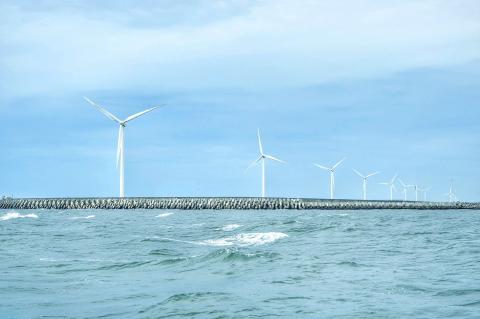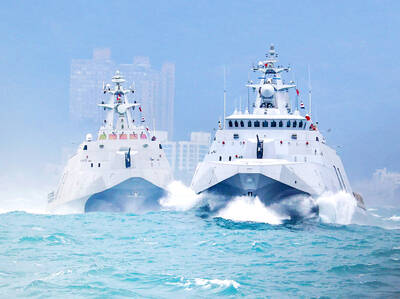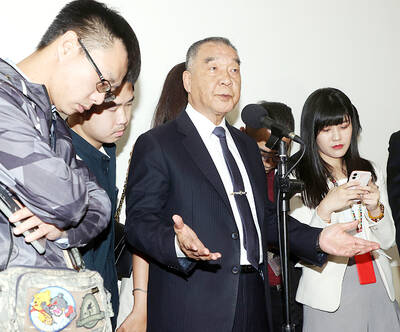The Executive Yuan has approved measures to liberalize the power market and break up state-run Taiwan Power Co (Taipower, 台電), as well as increase the number of public kindergartens by 1,000 by 2020 to expand childcare coverage and increase women’s participation in the workforce.
The Executive Yuan yesterday passed an amendment of the Electricity Act (電業法) that would deregulate the power market and promote “green” energy.
The proposal calls for Taipower to transform into a holding company with subsidiaries.

Photo courtesy of Taiwan Power Co
According to the draft amendments, “green” energy firms will be allowed to sell and transmit electricity to users directly, with pricing being freely negotiated between generating companies and clients, Bureau of Energy Director-General Lin Chuan-neng (林全能) said.
Currently, firms can only sell power to Taipower, Lin said.
Businesses will be permitted to operate traditional power plants, but they can only sell electricity to Taipower, he said.
To complete the separation of power generation and electricity distribution, Taipower has to be divided into subsidiary companies in six to nine years following the passage of the draft amendment by the Legislative Yuan, with a company responsible for power generation and another for distribution and retailing, Lin said.
The “public electricity retailing industry,” which is to be composed of Taipower spinoffs, would be obliged to supply power to the public, which will also have the choice to purchase “green” energy, he said, adding that “non-renewable” electricity rates would be regulated to offset price fluctuations due to global fuel costs.
The Executive Yuan was planning an across-the-board liberalization to deregulate both the traditional and renewable energy markets, but the latest amendment is mainly focused on the “green” energy sector, Executive Yuan spokesman Hsu Kuo-yung (徐國勇) said.
The traditional power sector would be liberalized in the next round of legislation to allow operators to freely enter electricity retailing, Hsu said.
“The government has adopted a gradual approach to liberalization to prevent the legislation from being stalled,” he said.
The legislation is necessary, as Taipower’s monopoly of the industry is what is prohibiting rapid growth in the renewable energy industry, Premier Lin Chuan (林全) said, adding that it is the government’s priority to liberate the “green” energy market during this legislative session.
“Criticism saying that the legislation would lead to higher electricity prices and the monopolization of the power market by business groups is incorrect,” Hsu quoted the premier as saying.
“The percentage of green energy in the nation’s power grid is too low and even if the price of green energy increases several times over [following the liberalization], it would not affect electricity supply,” Minister of Economic Affairs Lee Chih-kung (李世光) said.
Hydroelectric and nuclear power plants will continue to be state-run.
Meanwhile, the Executive Yuan is to budget NT$6.2 billion (US$196.6 million) to establish 1,000 kindergartens in the next four years.
Minister of Education Pan Wen-chung (潘文忠) said the plan is to boost the number of “non-profit kindergartens” — facilities run privately on refurbished public properties — and public kindergartens.
The plan is expected to raise the percentage of children enrolled in public or non-profit kindergartens from 30 percent to 40 percent by 2020, Pan said.
“The measure will provide affordable childcare to allow women to enter the workforce,” Pan said.

ROLLER-COASTER RIDE: More than five earthquakes ranging from magnitude 4.4 to 5.5 on the Richter scale shook eastern Taiwan in rapid succession yesterday afternoon Back-to-back weather fronts are forecast to hit Taiwan this week, resulting in rain across the nation in the coming days, the Central Weather Administration said yesterday, as it also warned residents in mountainous regions to be wary of landslides and rockfalls. As the first front approached, sporadic rainfall began in central and northern parts of Taiwan yesterday, the agency said, adding that rain is forecast to intensify in those regions today, while brief showers would also affect other parts of the nation. A second weather system is forecast to arrive on Thursday, bringing additional rain to the whole nation until Sunday, it

LANDSLIDES POSSIBLE: The agency advised the public to avoid visiting mountainous regions due to more expected aftershocks and rainfall from a series of weather fronts A series of earthquakes over the past few days were likely aftershocks of the April 3 earthquake in Hualien County, with further aftershocks to be expected for up to a year, the Central Weather Administration (CWA) said yesterday. Based on the nation’s experience after the quake on Sept. 21, 1999, more aftershocks are possible over the next six months to a year, the agency said. A total of 103 earthquakes of magnitude 4 on the local magnitude scale or higher hit Hualien County from 5:08pm on Monday to 10:27am yesterday, with 27 of them exceeding magnitude 5. They included two, of magnitude

The navy next month is expected to commission into service two more domestically built Tuo Chiang-class stealth missile corvettes, a source said yesterday. The Hsu Chiang (旭江, PGG-621) and the Wu Chiang (武江, PGG-623) would be officially commissioned in a ceremony early next month, the source said, speaking on condition of anonymity. The corvettes, launched in February and June last year respectively, were delivered to the navy in February. They are the third and fourth Tuo Chiang-class stealth missile corvettes to be produced. The Tuo Chiang-class corvette is a domestically designed and manufactured class of fast and stealthy multipurpose corvette built for the

A total of 41 US military personnel were stationed in Taiwan as of December last year, a US congressional report said on Friday last week ahead of Tuesday’s passage of an aid package that included US$8 billion for Taiwan. The Congressional Research Service in a report titled Taiwan Defense Issues for Congress said that according to the US Department of Defense’s Defense Manpower Data Center, 41 US military personnel were assigned for duty in Taiwan. Although the normalization of relations with the People’s Republic of China (PRC) in 1979 included a vow to withdraw a military presence from Taiwan, “observers have indicated